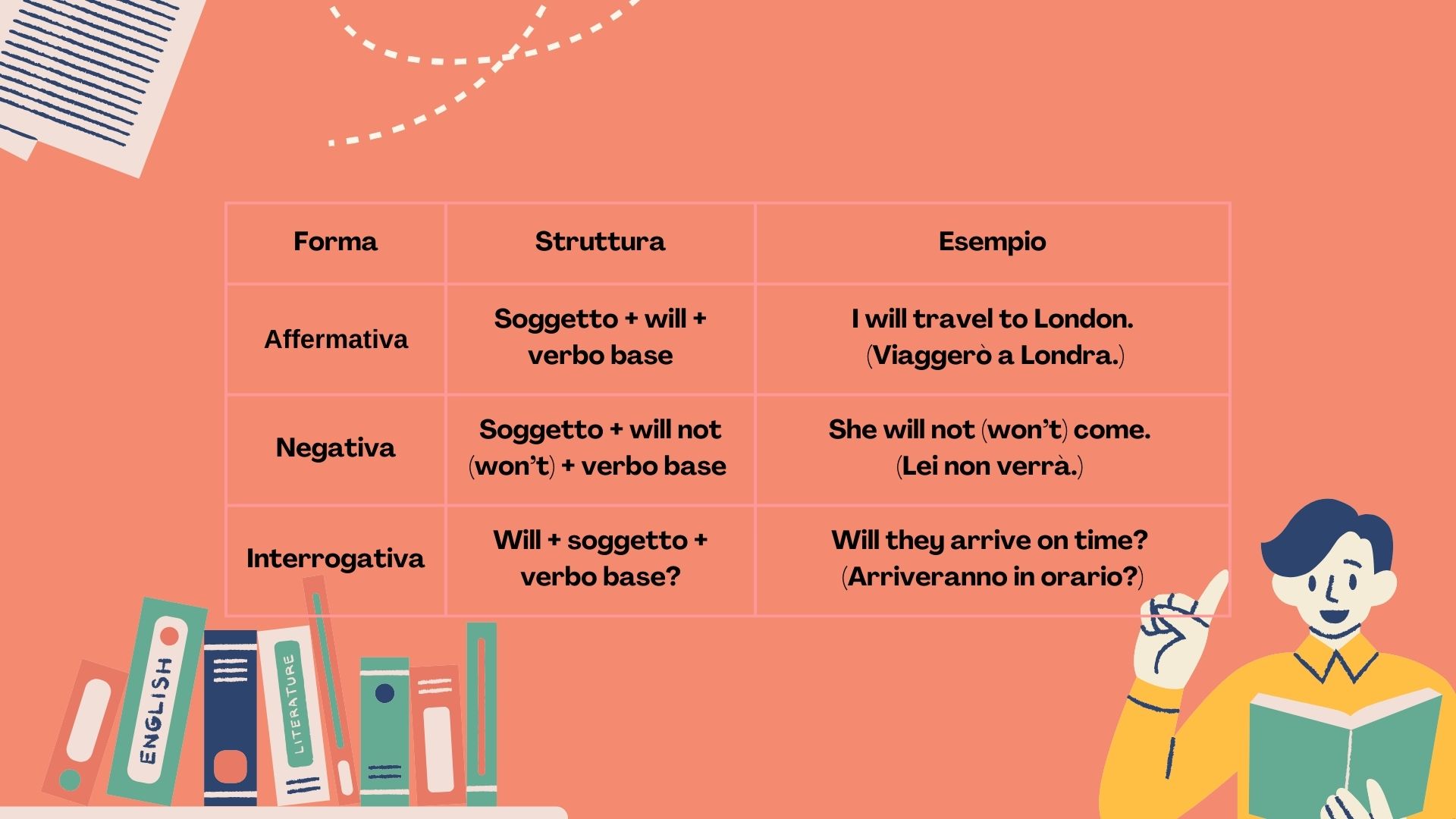Futuro Con “Will”

Il futuro con "will" è uno dei tempi verbali più comuni in inglese per esprimere azioni che accadranno in un momento successivo al presente. In questo articolo esploreremo la forma affermativa, negativa e interrogativa del futuro con "will", fornendo esempi pratici e spiegazioni su quando utilizzarlo.
Forma affermativa del futuro con "will"
La forma affermativa del futuro con "will" è molto semplice: si usa il verbo "will" seguito dalla forma base del verbo principale. In inglese, non c'è bisogno di modificare il verbo in base al soggetto (contrariamente a quanto avviene in italiano, dove i verbi cambiano in base al soggetto).
Struttura:
Soggetto + will + verbo base
Esempi:
- I will go to the cinema. (Andrò al cinema.)
- She will study for the exam. (Lei studierà per l'esame.)
- We will have lunch at 1 PM. (Pranzeremo alle 13.)
Forma negativa del futuro con "will"
Per creare la forma negativa del futuro con "will", basta aggiungere "not" dopo "will". La contrazione di "will not" è "won't", che viene utilizzata nella lingua parlata e scritta in modo informale.
Struttura:
Soggetto + will not (won't) + verbo base
Esempi:
- I will not (won’t) go to the cinema. (Non andrò al cinema.)
- He will not (won’t) come to the party. (Lui non verrà alla festa.)
- We will not (won’t) have dinner at home. (Non ceneremo a casa.)
Forma interrogativa del futuro con "will"
Il futuro con la parola "will" utilizzata si presenta in contesti diversi. Puoi partecipare alle nostre lezioni di inglese online per comprendere appieno come utilizzare questa grammatica, ma eccone alcune delle principali:
Struttura:
Will + soggetto + verbo base?
Esempi:
- Will you go to the cinema? (Andrai al cinema?)
- Will she pass the exam? (Lei supererà l'esame?)
- Will they help us with the project? (Ci aiuteranno con il progetto?)
Riassunto delle forme del futuro con "will"

Uso del futuro con "will"
Il futuro con "will" viene utilizzato in diversi contesti. Ecco alcuni dei principali:
1. Previsioni e probabilità
Quando si parla di ciò che pensiamo o crediamo che accadrà nel futuro.
- I think it will rain tomorrow. (Penso che domani pioverà.)
- She will probably call you later. (Probabilmente lei ti chiamerà più tardi.)
2. Decisioni spontanee
Quando si prende una decisione sul momento, senza pianificarla in anticipo.
- I’m thirsty. I will drink some water. (Ho sete. Bevo dell'acqua.)
- I’ll help you with that. (Ti aiuterò con quello.)
3. Promesse e intenzioni
Per esprimere una promessa o un'intenzione.
- I will always love you. (Ti amerò sempre.)
- We will visit you next summer. (Ti visiteremo la prossima estate.)
4. Richieste e offerte
Quando si offre o si chiede qualcosa.
- Will you help me with this task? (Mi aiuterai con questo compito?)
- I will carry your bag. (Porterò la tua borsa.)
Conclusione
Il futuro con "will" è un tempo verbale semplice e versatile, usato per esprimere previsioni, decisioni, promesse, richieste e offerte. La sua struttura è facile da imparare, e la comprensione delle forme affermativa, negativa e interrogativa è essenziale per comunicare in inglese.
